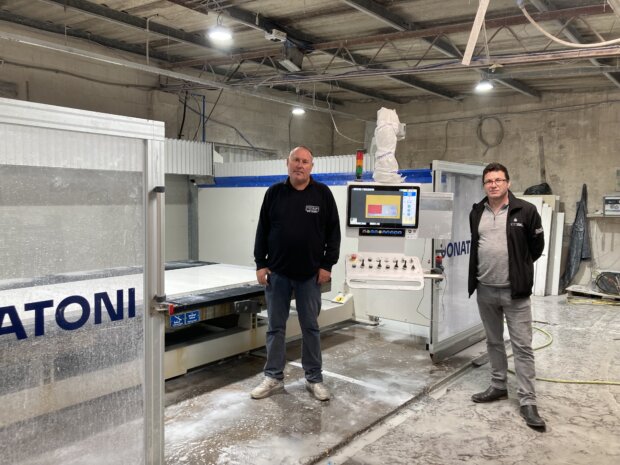A North East worktop manufacturer has revealed how digital simulation software has helped the 25 year old business visualise a brighter future.
Nostalgia Work Surfaces (NWS), based in Washington, has cut costs and lead times and ramped up productivity after receiving support from a team of manufacturing experts.
After receiving technical support and funding from the £10.9 million Sustainable Advanced Manufacturing (SAM) Project, NWS was able to use state-of-the-art FlexSim software to help validate that they had the space required to install the new equipment required to achieve its future plans.
The firm had long considered investing in a new CNC saw to help improve its product quality and reduce lead-times, however the investment was substantial to elevate the cutting capability from traditional into the digital interface of next generation CNC machinery.
The support from SAM – which included an expert workshop on manufacturing management techniques and one-to-one support from a simulation specialist – meant NWS could use state of the art 3D simulation software to identify where the equipment would fit within its setup and avoid any installation pitfalls.
A grant also supported the purchase of a new CNC saw, which has significantly cut costs for the company and reduced its carbon footprint since its installation in July 2022, as well as being faster, more versatile plus reducing off-cuts and waste.
Alan Taylor, managing director at Nostalgia Work Surfaces, said: “We are really pleased with the impact the new CNC saw has had on the business.
“It has not only increased productivity, standards and reduced waste but it has also given the workforce a greater sense of pride, lifting their standards and attitudes to a new level.”
He added: “We couldn’t have done it without SAM. One of the key inhibitors to growth we’ve witnessed has been the inability to move our workshop around without impacting upon production and their support has been key to helping us overcome this challenge.
“Prior to speaking to the team, we would never have even thought of using simulation software as a means of re-designing our workspace and figuring out how to improve our processes. It would’ve just seemed like an alien concept.
“The grant also went a long-way to helping us purchase the machinery we needed. We really can’t recommend the support enough.”
Nostalgia Work Surfaces currently employs 13 people at its Swan Industrial Estate site, however Alan is confident that – despite the many challenges currently facing the nation’s manufacturers – the company’s recent investment will allow it to continue creating jobs as it looks to the future.
“Because of the ability of the machine, we are now able to take on more complex work, angles and curves, resulting in the manufacture of more complex products which would not have otherwise been possible,” he said.
“Looking forward, we hope this will not only allow us to introduce new product ranges and improve quality, but also create more jobs as we continue to innovate and grow.”
The Sustainable Advanced Manufacturing (SAM) Project is a £10.9m collaboration between the European Regional Development Fund (ERDF), the University of Sunderland and the Northern Powerhouse Initiative and Industry, supporting SME manufacturers in the North-East Local Enterprise Partnership (NE LEP) area to improve their products or processes and introduce new technology.
Roger O’Brien, Project & Technical Lead at the SAM Project, said: “It’s been fantastic working with Alan and the team on this project and seeing how the latest simulation technology can help businesses such as NWS break down their barriers to growth.
“Over the past few years, we’ve helped hundreds of companies just like Nostalgia explore how the latest industrial technologies can help them innovate and we’d recommend any SME in the region which manufacturers – or has plans to manufacture – to get in touch while the support is available.”



